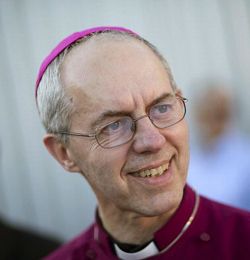Message from Justin Welby, Archbishop of Canterbury
A message from the Archbishop of Canterbury to Prior Enzo and the Community of
the Monastery of Bose and all attending the Twenty Second International
Ecumenical Conference on Orthodox Spirituality, 3-6 September 2014
Wednesday 3rd September 2014
It gives me great pleasure to send you greetings in the name of our Lord and Saviour Jesus Christ. This community has from its beginnings taken as its unique task the strengthening of relationships between Churches. Reconciliation has been its key thrust.
The theme of this Twenty Second International Conference of Blessed are the Peacemakers is most appropriate in the light of so many grave situations of conflict across the world today. These conflicts confront the Church with the challenge of peace-making. The Conference is an opportunity to pray together, but also to reflect theologically, share testimonies, information and insight from many contexts on proactive ways to resolve conflict and foster peace. The devastating effects of conflict on civilian populations, and particularly on religious minorities in Northern Iraq and other parts of the Middle East - to mention only one complex region of strife - do not leave us untouched. Our calling to be faithful to our Christian task of peacemaking, of being agents of peace, has become acute.
The condition of peace often appears elusive and even paradoxical. Jesus' words from the Beatitudes in Matthew's Gospel are: "Blessed are the Peacemakers", which puts the onus on his followers to actively create peace. In John 14:27 the words of the risen Christ: "Peace I leave with you; my peace I give to you" suggest that peace is a given state, among his followers at least. This paradox is solved if we realise that the gift of peace is
ours to claim, but that it can only be realised for ourselves as Christians and for the world, if we work for peace. Therefore, central to our calling to be Christians in the world is to be able to experience the peace of God and to be peacemakers in the world. The Cross heals relationships and makes peace not only between God and humanity but also between peoples and nations. Our Lord's self-sacrifice on the Cross opened the way to creating this new humanity by overcoming dividing walls of hostility.
The Cross is God's path in responding to conflict. It exemplifies reconciliation as the cure to hostility and violence between peoples and nations, and is also demonstrated in the work to bring about the restoration of relationships between churches. As peacemakers we bear one another's burden, support one another and hold each other accountable to God.
In the current context in which we are conscious more than ever of the scandal and tragedy of war and in which hope seems distant, we are challenged to remain faithful to our prayer-focussed spirituality in Christ and a vision of the Kingdom of God, in which there is repentance and renewal, dignity, justice, interdependence and love. Christ lifted up on the cross communicates to the world the message of peace and reconciliation. Peace for Christians is therefore not an option but is our way of life and an expression of being "in Christ" (Ephesians 4:13).
May these days of prayer and discussions strengthen the faithful within the fragmented Body of Christ to an effective common global witness as peacemakers.
+ Justin Welby
Archbishop of Canterbury
